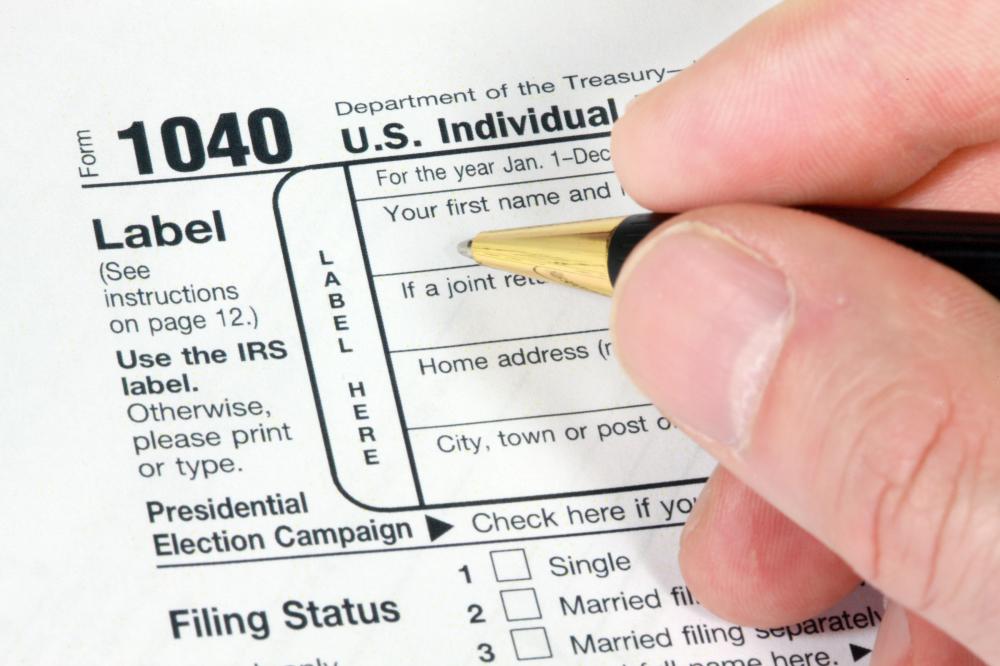At WiseGEEK, we're committed to delivering accurate, trustworthy information. Our expert-authored content is rigorously fact-checked and sourced from credible authorities. Discover how we uphold the highest standards in providing you with reliable knowledge.
What Should I do if I Owe More Income Tax Than I can Afford to Pay?
Some people are unpleasantly surprised to find they owe more income tax than they can afford to pay when they file their taxes. There are several ways to negotiate making payments to the Internal Revenue Service (IRS) that can make repaying owed income tax much easier. Most important is to be sure to file on time, and to make any scheduled payments on time as the IRS can assess large fees if one does not keep to any agreements.
Prior to filing, one should also be sure to check one’s income tax return for possible mistakes. It is often the case that people figure their taxes incorrectly. Check for all errors and possible loopholes, which can reduce or do away with one’s tax debt.

If the income tax owed is a large amount, and too difficult to pay at once, the first thing to do is write a letter to the IRS with at least a partial payment. This amount does not have to be huge, but it should be at least 10% of the amount owed, when manageable. If the amount needs to be smaller, this is generally acceptable, since it does establish willingness to pay.

Instead of simply not paying or not filing an income tax statement, one should file on time to avoid fines and fees. Further, the income tax statement should be accompanied with a written statement about how much one can pay and plans to pay on a monthly basis. Be sure this amount is realistic and can be met exactly as stated in one’s proposed repayment schedule.
The advantage to proposing a schedule is that it allows one to set the terms for repayment, instead of leaving this matter up to the IRS. The IRS can reject your proposal, particularly if repayment will take longer than a year. However, often, the IRS is quite happy to work with a person who demonstrates earnestness and willingness to pay off their taxes.
Once you have determined a plan, and even before receiving notification from the IRS, start making proposed payments. It is essential that one stick to the terms outlined in one’s agreement. The IRS is likely to be more amenable to an agreement that is already being honored. Further, the IRS can respond to non-payment by garnering one’s wages, so staying current on one’s debt is very important.
If for any reason, one cannot make a monthly payment, one should inform the IRS in writing. A good reason needs to be provided. One can also call the IRS to inform them, but any communication with the IRS about income tax repayments should also take place in writing. Maintaining good records is valuable should you need to refer to them in the future.
Also, evaluate your current withholding status to see where errors were made. One doesn’t want to face the next year with a new income tax debt to pay. Often people make the mistake of taking too many deductions on their income tax during the year, causing too little to be withheld. Speaking to an accountant, or a helpful person in personnel or human resources at one’s work can assist with avoiding income tax debt in future years.
AS FEATURED ON:
AS FEATURED ON:












Discussion Comments
Some people try to cheat on their taxes when they find out that they owe more than they can afford. I guess it’s just a gut reaction to try to get out of trouble fast…but then they find they can’t sleep too well 'cause they're scared to death of getting audited. Some do and some don’t, but I think it’s like three years that the IRS can come knocking. Think long and hard before just cheating. I guess some people could cheat big time and never think twice, but a lot of us just couldn’t be that laid back about it.
If it just so happens that you owe more money than you can afford to pay (like happened to me not too long ago – ugh) the best thing to do is just accept it. Do check with an income tax calculator and make sure there are no mistakes on your forms, but then just go ahead and bite the bullet. It’ll be so much easier if you go ahead and set up a payment plan. Actually, the government will work with you if you act responsibly. I was really surprised at how understanding they were – but I still had to pay what I owed. Bummer, but it could have been worse.
Post your comments